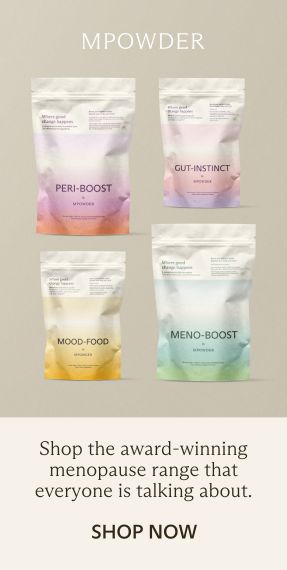‘Emotional Freedom Technique’, also known as tapping, is a powerful stress relief technique which combines the principles of ancient Chinese acupressure with modern psychology. To understand a little more about the science supporting its value in our midlife toolkit, I sat down with MPowder’s resident naturopath and herbalist, Dr Martins.
_
Rebekah: Dr Martins, I know that you’re passionate about the potential of tapping - particularly in addressing anxiety in menopause. But before we get into why it works and how we can integrate it into our own toolkit for Part 2, can you explain what it is?
Vera: Tapping is a clever combination of both cognitive and somatic elements that was created in the 19080s by the psychologist called Roger Callahan, who started combining his studies in traditional Chinese medicine with his knowledge as a psychologist to create a new kind of treatment. Later Gary Craig, who trained under Dr. Callahan, developed the process by creating a simple sequence that could be easily learned by the patient. And Emotional Freedom Techniques, or EFT for short was born.
Tapping encourages you to focus on a particular issue or emotion whilst tapping on specific meridian points which are considered hot spots of energy. Tapping on these meridian points while incorporating positive thoughts and affirmations sends calming signals to the brain, letting it know it’s safe to relax, it helps your body move away from the ‘fight-or-flight’ response, which is the body’s natural reaction to a perceived threat and known to trigger the release of stress-related hormones.
_
Rebekah: What does science tell us about EFT? What is it that makes it work?
Vera: We know that tapping helps us engage with our parasympathetic nervous system, reducing levels of the stress hormone cortisol so we can reach ‘rest and digest’ mode.
When our bodies are in “rest and digest” mode, our immune system, digestive system, reproductive system, and endocrine system are able to function properly. What does this mean? Better resistance against infections, better digestion and a happy microbiota - the community of good bacteria that live in the gut, more balanced hormones (yay!!), more energy, better mood, better sleep... better you.
What I find so exciting and reassuring about tapping is that, although it’s a relatively new technique, it is quite well researched. Several studies, systematic reviews and meta-analyses have demonstrated tapping’s efficacy for both physiological and psychological symptoms, including anxiety, depression, insomnia, emotional eating, and PTSD. One of the most remarkable studies, a randomised control trial with 83 participants, showed that tapping significantly reduced cortisol levels to a higher extent than talking therapy, and these results were subsequently replicated by another study. There are currently more than 100 studies on tapping published in peer-reviewed journals.
_
Rebekah: Why do you consider EFT to be such a useful addition to our toolkits in menopause?
Vera: I find tapping such a practical and versatile tool. Its beauty lies in the fact that, once you learn it, it can be practiced on your own, anywhere, with fast results. It makes you feel empowered!
Because tapping helps with anxiety, depression, and insomnia, amongst other health concerns, tapping can be an extremely useful tool in menopause, as the main symptoms experienced during perimenopause - what we call “Cluster symptoms” - include anxiety, mood swings, poor sleep, brain fog and fatigue.
Perimenopause reduces our resilience to stress and at the same time, stress impacts our hormone balance and further exacerbates symptoms of menopause.
Data from the SWAN study shows that women in perimenopause perceive higher levels of stress than premenopausal women, while other data demonstrates the rate of major depressive disorders and depressive symptoms increases 2 to 3-fold during the menopause transition. And, when we experience chronic stress it impacts our sex hormones oestrogen, progesterone and testosterone and affects cortisol production, with potential implications on weight management, insomnia, fatigue, type 2 diabetes and cardiovascular disease. Interestingly, a randomised controlled trial with 88 menopausal women with mild to moderate depression, shows that using tapping for 8 weeks significantly reduced the mean score of depression.
And while there is no evidence yet in regards to the benefits of tapping in the management of hot flushes specifically, I have found it to be very helpful in clinic. The link between stress, anxiety and hot flushes is well established, with Cognitive Behavioural Therapy and breath work known to be effective in addressing their severity. I think tapping offers a promising additional technique - and that we’re likely to see more research in this area.
_
Rebekah: Alongside anxiety and vasomotor symptoms, where else can EFT support us in midlife?
Vera: Tapping is a great tool to manage our emotions and self-criticism, helping us to create more loving thoughts and acceptance towards ourselves. A healthy relationship with food and our body is key for long lasting results, pleasure (it’s very important to enjoy our foods without guilt!), and ultimately balance and happiness.
We may also benefit from tapping away that inner critical voice! The effects of tapping on eating behaviour and body image is currently a really interesting topic of research, with several studies showing its benefits. Tapping seems to reduce food cravings, emotional eating and support weight loss. And very importantly, it produces long-term sustainable results of up to 2 years in clinical trials.
Emotional eating can happen to any of us, and involves eating for comfort even when we are not hungry. It’s a way to temporarily relieve negative emotions like stress, anxiety, low mood or boredom, and it can become a vicious cycle. Stress can also make us reach for unhealthy options when it comes to food. Another link between stress/anxiety and weight gain is the fact stress increases the stress hormone cortisol, which has been shown to increase sugar cravings and weight gain particularly around the abdomen (very typical in menopause). This is where tapping may help impact, and there is increasing research to support exploring tapping as a serious weight management tool.
A study with over 200 participants showed that a 4-day EFT workshop reduced cravings by 74%, as well as anxiety by 40%, depression by 35% and cortisol by 37%. Another study with 76 participants who went through a 6-week clinical EFT course that focused on improving emotional eating, resulted in participants losing an average of 1 pound per week; a one-year follow-up showed participants continued to lose weight, about 2 pounds per month. In one study, tapping was comparable to CBT as a psychological intervention in reducing food cravings. And a tapping programme for weight loss resulted in participants losing as average of 13 pounds over 6 weeks.
_
Rebekah: If we want to explore introducing EFT into our routines, how do you suggest we best start?
Vera: Tapping is very easy to practice. And, because it addresses the root cause of health issues with a psychological and emotional component, it can be successfully applied to support several symptoms in different set-ups.
I like to recommend people practice first thing in the morning to set a calm tone for the day. But if you are someone who starts the day at full speed, it can also be practiced at bedtime to help you get to sleep - or calm you if wake up during the night). It can also be use at any time during the day before or after a stressful event.
Curious to explore further? Follow these simple steps to get started:
1.
Start by identifying the issue and its associated emotions you want to address.
2.
Establish your personal ‘set up statement’. This statement has two parts. The first acknowledges the issue and the second part should focus on self acceptance. A typical statement may look like ‘Even though I feel this (eg: anxious about a conversation with my boss about workload), I accept myself and how I feel’.
3.
Then, you engage in the tapping process on specific acupressure points by using your fingertips (usually 5-7 taps on 9 meridian points on the upper body and face) while repeating the statement or a shortened version.
Dr Martins recommends the mobile app, ‘The Tapping Solution’, which offers different guided sessions based on emotions too. And if you want to go deeper, you may also want to consider seeing a Tapping practitioner for a tailored approach.
To learn more about tapping:
Book:
The Tapping Solution for Weight Loss & Body Confidence
by Jessica Ortner
Research sources:
www.swanstudy.org/
eftuniverse.com/research-studies/
pubmed.ncbi.nlm.nih.gov/22986277/
pubmed.ncbi.nlm.nih.gov/32162958/
pubmed.ncbi.nlm.nih.gov/34013673/
pubmed.ncbi.nlm.nih.gov/27140673/
pubmed.ncbi.nlm.nih.gov/29370983/
pubmed.ncbi.nlm.nih.gov/30777453/
Share Twitter Facebook Pinterest

